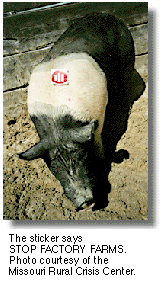Facts about Hogs
Information courtesy the Humane Farming Association
San Francisco, California
About Pigs
 Contrary to common perception, pigs are intelligent, sensitive, and clean animals. When given the opportunity, they will allot separate areas for resting and defecating. Pigs are also very active, able to travel 30 miles a day at a quick pace. Contrary to common perception, pigs are intelligent, sensitive, and clean animals. When given the opportunity, they will allot separate areas for resting and defecating. Pigs are also very active, able to travel 30 miles a day at a quick pace.
Pigs naturally live in groups and are governed by a well-defined social order. In the evening, group members will prepare a communal nest from branches and grass in which they will spend the night.
Noted ethologist, Dr. Alex Stolba, observed that domestic pigs living in a natural environment spend 31% of the day grazing, 21% of the day rooting, and 23% of the day interacting with the environment in other ways. The behaviors of domesticated pigs bred for factory farm production were found to be identical to those of pigs living in the wild.
It is not always viable to raise pigs in a completely natural environment. But responsible family farms are able to raise pigs in healthful environments which provide for the animal's basic needs.
Unfortunately, the agribusiness drug companies and large corporate farms that profit from factory farming vigorously oppose any system other than the drug-dependent confinement methods which now dominate the pork industry.
Here a Crate, There a Crate
Factory farming has long been associated with veal production. But there is another animal which suffers confinement similar to that of the veal calf- the breeding sow. And in her case. the agony is prolonged for years.
After impregnation, the sow is locked in a narrow metal gestation crate. The width of the crate varies from 18 to 24 inches and the length extends just barely beyond the sow's own body. She is restrained in this unbedded. cement-floored crate for her entire pregnancy - nearly four months. She is unable to walk or turn around.
She is fed at one end of the crate, and her feces collects at the other. Some crates are so narrow that simply standing up amd lying down require strenuous effort. On some factory farms, the sow is literally tied to the floor by a short chain or strap around her neck. Deprived of all exercise and any opportunity to fulfill her behavioral needs. she lives in a constant state of distress.
Factory farm apologists claim that crated pigs are "content". As proof, they point to the fact that the sow continues to produce piglets. But it is the sow's strong reproductive system that enables her to continue reproducing in spite of the crate.
The crate takes a terrible toll on these female pigs who suffer greatly from leg problems and intolerable stress. A sow locked in a gestation crate is often found rubbing her snout back and forth across the front of the crate or frantically and repeatedly biting the metal bars.
Scientists studyung these repetitive movements (called stereotypies), found that this behavior may stimulate the release of endorphins in the sow's brain. This "self-narcotization" may provide a temporary measure of relief from the torment of crate confinement. Others have concluded that these abnorrnal behaviors are simply the desperate expressions of frustrated animals pushed to the point of madness.
Agricultural scientists note that the behavior exhibited by confined sows, "resembles, in many respects, the development in humans of chronic psychiatric disorders."
Laws in Europe are being enacted to outlaw gestation crates,but until now, little has been done to discourage the use of such crates in the United States. And unfortunately, the cruel confinement of sows in the United States takes place on a much larger scale than in European countries. At this mornent hundreds of thousands of sows are held captive in these desolate pig prisons.
Fewer farms - Greater problems
In 1970, 85 million pigs were slaughtered in the U.S. In 1990, the numbers were the same. The difference: the vast majority of pork in the U.S. now comes from factory farms.
The Humane Farming Association is headquartered in San Francisco at 1550 California St., San Francisco, CA 94109. The phone is (415) 485-1495.
|



 Contrary to common perception, pigs are intelligent, sensitive, and clean animals. When given the opportunity, they will allot separate areas for resting and defecating. Pigs are also very active, able to travel 30 miles a day at a quick pace.
Contrary to common perception, pigs are intelligent, sensitive, and clean animals. When given the opportunity, they will allot separate areas for resting and defecating. Pigs are also very active, able to travel 30 miles a day at a quick pace.